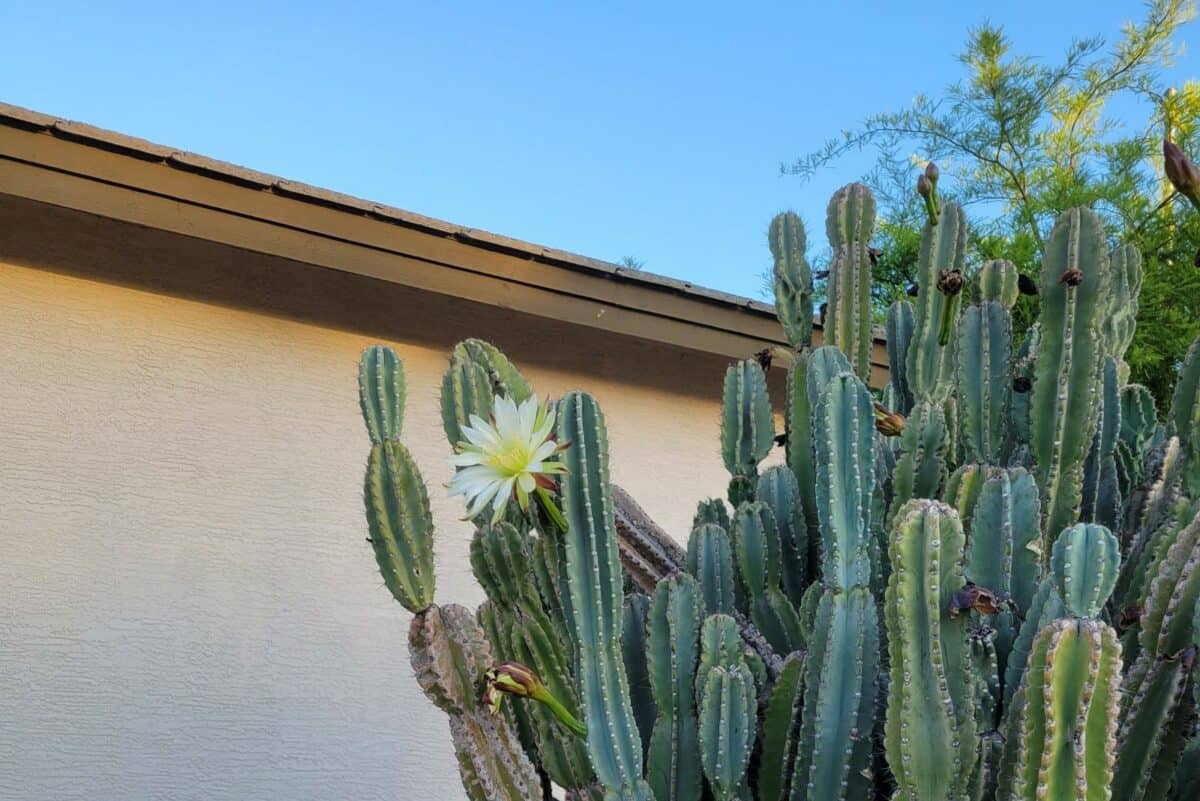- Making the Most of Your Patio with Stylish and Functional Shade Solutions - February 16, 2025
- How Shade Screens Can Help Reduce Cooling Costs with SRP Rebates - February 5, 2025
- The Health Benefits of Using Sunshades - January 26, 2025
When it comes to outdoor landscaping a lot of us are looking for a home garden that not only beautifies and cools our home, but we are looking for one that conserves water. Water prices continue to rise exponentially in the Phoenix surrounding area so any drops we can save can go a long way in cutting home costs, while helping lower the impact on our local ecosystem.
While many of us crave the water-reliant plants we may have grown up with back east, more and more people are looking to turn their home landscape into a cactus garden. You may find exquisite joy when you surround your home with towering barrel cactus, or the late spring surprise of a magenta flowering paddle cactus. You are not alone! More and more residents of the Phoenix area are turning to cactus and succulent plants as a solution for an inspiring and water conservation landscape. However, cactus require special care to thrive. Here are some tips to make sure your home cactus garden can flourish!
Cactus Care still requires Water
Cacti are amazing plants that have adapted to this dry hot climate in order to survive long stretches without water. Because they don’t technically have leaves, they don’t release water as much through evaporation. Meanwhile the thick stems of cactus are ideal for storing water, while a protective covering helps keep water inside. This allows some cactus species can go up to two years without water. However, this doesn’t mean that they don’t need any water at all. It is important to research the cactuses in your home to determine a regular water schedule. It is all too easy to forget to water during the long hot dry season and end up having to replace beloved plants.
How Much Water Do They Need?!
Particularly for a new planting, your cactus will need a bit more water to become established. However, eventually you can follow a more relaxed watering routine. Early spring to late autumn is the common growth period for cactus plants and this is when they will need to be watered the most. Once a week is ideal, however it is important to consider specific conditions such as location in relation to the sun and other unique conditions your cactus faces.
To ensure that your cactuses are getting ample enough to drink, check soil moisture on a weekly basis to guard against water loss. This is also the best time of year to fertilize your cacti, during the growing season. Diluting a balanced fertilizer of phosphorus, nitrogen and potassium can give your cacti the added boost to make your garden become a robust curb stopper.
Winter Cactus Care
As the hot dry growing season dissipates into chilly winter mornings and shorter days it’s a great time to decrease the frequency that you water. If you notice any wilting, it is an indication of water loss. Ask your local plant nursery or a quick internet search to determine the best course of action to rehabilitate your specific plant.
General Cactus Care Tips:
There are some basic things to consider when growing cacti. This includes:
Light: Many cacti are native to this region, however if they are receiving excessive amounts of light they may appear bleached or yellow.
Soil Health: check your soil to ensure a gritty mix with adequate aeration and excellent drainage. Cacti won’t thrive in wet soil, where they can be susceptible to root rot. Let your plants dry out between watering.
Plant Pest Control: Even out here, your cactus can be food for infestations of mealy bugs or spider mites. Since most plant pests are microscopic, diagnosis can be complicated. There are a lot of home remedies including an application of neem oil, a soapy solution, rosemary spray or beneficial predators.
CC Sunscreens
The summer months can be hot in the greater Phoenix area. In addition to a robust cactus garden, we have many solutions to keep your house cooler. This includes CC Sunscreen window shades and patio shades. Both options can reduce the solar gain on your home significantly, reducing your energy bill through the hot summer. In addition, they can block out up to 90 percent of the sun’s harmful solar rays. To find out more contact us today for a consultation.

